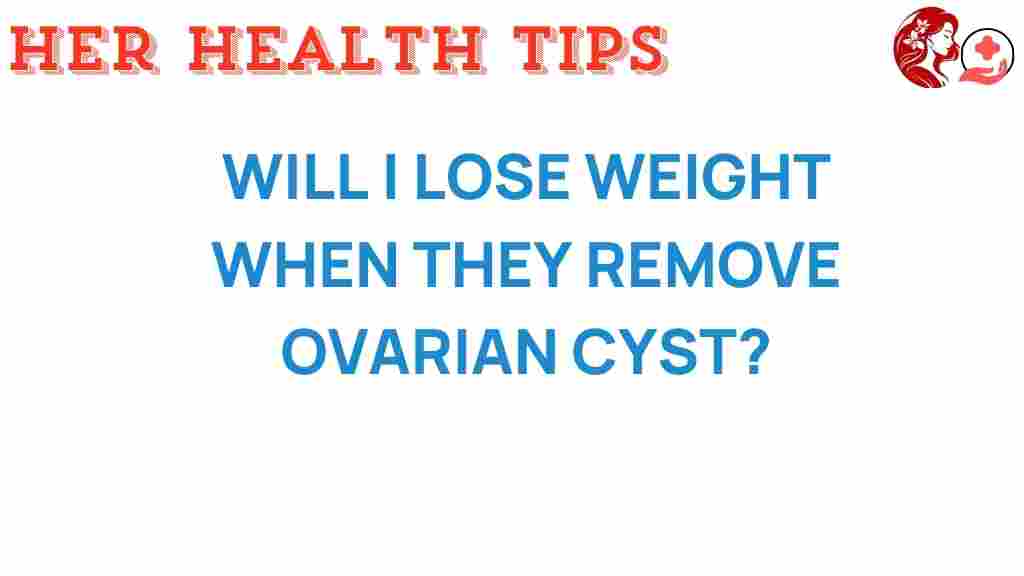Will Removing Ovarian Cysts Lead to Weight Loss?
Ovarian cysts are fluid-filled sacs that develop on the ovaries and are quite common among women of reproductive age. While many women experience them without any symptoms, some may face complications that lead to surgery. A question that often arises is, “Will removing ovarian cysts lead to weight loss?” This article delves into the connection between ovarian cysts, weight loss, and the broader implications for women’s health, hormones, body changes, and recovery.
Understanding Ovarian Cysts
Before we dive into the relationship between ovarian cysts and weight loss, it’s important to understand what ovarian cysts are. They are typically categorized into two types:
- Functional Cysts: These are the most common type and usually form during the menstrual cycle. They typically go away on their own and do not require treatment.
- Pathological Cysts: These can be more serious and may require surgical intervention. They include dermoid cysts, endometriomas, and cystadenomas.
Ovarian cysts may or may not cause symptoms. Some women may experience bloating, pelvic pain, or pressure, while others remain asymptomatic. In some cases, larger cysts can lead to complications such as rupture or torsion, necessitating surgical removal.
The Connection Between Ovarian Cysts and Weight
Many women notice body changes when dealing with ovarian cysts. These changes can sometimes include weight gain, which can be attributed to hormonal imbalances caused by the cysts. The presence of cysts can affect the production of hormones like estrogen and progesterone, leading to weight fluctuations.
So, will removing ovarian cysts lead to weight loss? The answer isn’t straightforward. While some women may experience weight loss following surgery, others may not notice significant changes. Here’s why:
Hormonal Imbalances and Weight Changes
The hormones produced by the ovaries play a crucial role in regulating metabolism and body weight. When ovarian cysts are present, they can disrupt the normal hormonal balance, potentially leading to:
- Increased appetite
- Fatigue, which can reduce physical activity
- Fluid retention
After surgery to remove the cysts, some women report a restoration of hormonal balance, which can lead to weight loss. However, this is not the case for everyone, and individual results can vary significantly.
The Surgical Procedure and Recovery
The surgery to remove ovarian cysts can be done via laparoscopy or laparotomy, depending on the size and type of the cyst. Here’s a step-by-step overview of the surgical process:
- Consultation: A gynecologist will evaluate the cysts and discuss the best surgical options.
- Pre-operative Preparation: This may include blood tests, imaging studies, and discussions about anesthesia.
- Surgery: Under anesthesia, the surgeon removes the cysts. This is typically done using minimally invasive techniques.
- Recovery: After surgery, patients may experience some discomfort and will need time to heal.
During recovery, women may notice changes in their bodies, including potential weight loss as hormonal levels stabilize. However, recovery also varies from person to person.
Post-Surgery Body Changes
Once the ovarian cysts are removed, women may experience a range of body changes:
- Hormonal Balance: With the cysts gone, hormone levels may normalize, which could lead to improved metabolism and weight loss.
- Decreased Bloating: Many women report feeling less bloated and experiencing a flatter stomach post-surgery.
- Energy Levels: As discomfort decreases and hormonal balance is restored, many women find they have more energy for physical activity.
However, it’s essential to note that these changes can take time to manifest and may not be immediate.
Addressing Misconceptions
There are several misconceptions regarding ovarian cysts and weight loss. Here are some common myths:
- Myth 1: All ovarian cysts cause weight gain.
Reality: While some women may experience weight gain, not all cysts have this effect. - Myth 2: Surgery guarantees weight loss.
Reality: Weight loss after surgery is not guaranteed and varies among individuals. - Myth 3: Removing cysts is dangerous and leads to long-term health issues.
Reality: Surgery is generally safe and can alleviate symptoms and prevent complications.
Steps to Promote Healthy Weight After Surgery
If you have undergone surgery for ovarian cysts and are looking to manage your weight effectively, consider the following steps:
- Follow a Balanced Diet: Focus on whole foods, including fruits, vegetables, lean proteins, and healthy fats.
- Stay Hydrated: Drinking plenty of water can help reduce bloating and promote overall health.
- Engage in Regular Exercise: Physical activity can boost metabolism and improve recovery.
- Monitor Hormonal Health: Regular check-ups with your healthcare provider can help ensure hormonal balance.
For more information on managing weight and health after ovarian surgery, consult reliable sources such as the Office on Women’s Health.
Conclusion
In conclusion, while removing ovarian cysts may lead to weight loss for some women, it is not a guaranteed outcome. The relationship between ovarian cysts, weight, and hormonal balance is complex and varies greatly among individuals. Understanding the potential body changes, addressing misconceptions, and adopting a healthy lifestyle post-surgery can help in achieving optimal health and wellness.
If you’re considering surgery for ovarian cysts or have concerns about weight changes, it’s crucial to discuss these with your healthcare provider. They can provide personalized advice based on your specific health needs.
For further reading on women’s health and hormonal issues, check out our next article here.
This article is in the category Reproductive and created by HerHealthTips Team
